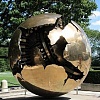North Korea and its Nukes
In
Log in if you are already registered
A couple of decades ago North Korea was a country barely noticeable to anyone in the world. Today it is on everyone’s radar screen. And its leader Kim Jong-un, “the sun of the 21st century”, brightly shined in headlines of all morning papers after North Korea conducted its third most powerful nuclear test on February 12. The test prompted united condemnation from around the world. Even China, Pyongyang's only ally, condemned the act. North Korea will most likely face tougher sanctions that might make its citizens even more miserable. Even though, it is in Pyongyang's interests to negotiate about halting the nuclear program, the regime can never agree to dismantle it completely.
North Korean Foreign Ministry described the test as “a resolute step for self-defense” necessitated by the U.S. hostile behavior, especially by implementing before anyone else the UNSC's "resolution on sanctions". Pyongyang most likely deliberately chose this day - February 12 - to detonate its atomic device - as it coincides with Obama’s annual State of the Union address. The test was a sign of lost patience aimed at showing the United States that North Korea will fight to the last to defend its sovereignty.
The test clearly violated previous UN Security Council resolutions. All members of the UN Security condemned Pyongyang's latest nuclear test. The January resolution that sharpened sanctions on North Korea in wake of its ballistic missile launch stated that if North Korea were to do something like this again then the UNSC would take significant new action. Subsequently, the UN Security Council now faces the task of imposing tougher new sanctions to hold North Korea responsible for any consequences of this provocative act.
Further sanctions could probably include measures against foreign companies doing business in North Korea, but these sanctions might seriously affect China’s interests as it is increasingly engaged in mining DPRK’s reach mineral resources. Even though China is interested in keeping North Korea as a buffer against a democratic, capitalist Republic of Korea its frustration with Pyongyang has grown as shown by its support of UN sanctions this January. Moreover, China might also feel pressed to help in curbing Pyongyang, because if it doesn’t, it will most likely face accelerated ballistic missile defense efforts by the United States in Northeast Asia.
If North Korea continues in this way, it will find itself in complete isolation. It is not a secret that the country has hardly an economy to speak of and the isolation will make suffer dirt poor North Koreans even more. The Kim dynasty’s nuclear ambitions certainly have not provided North Korean families with more food, but they have helped Kim Jong Il to stay in power. If his son doesn’t want to lose power he will have to follow his father’s path. As the leader of such a poor country can only preserve power if he manages to foment terror at home and abroad.

If one day Kim Jung-un decides to completely eliminate the nuclear program, then the next day “the sun of the 21st century” will be removed from power and the West will try to plant the seeds of democracy in North Korea. Additionally, all the foreign aid, that was pouring in the country in exchange for empty promises to halt nuclear program, did enrich “Dear Leader” Kim Jung Il (his net worth is $4 billion) and his generals.
Thus, it is quite beneficial for the boy leader to have the nuclear program as it would help him to deter foreign attacks. At the same time it is in Kim Jung-un's best interest to also negotiate about halting its nuclear program because all the foreign aid, food relief and technology transfers would help him to eliminate any threat to his power from within.




